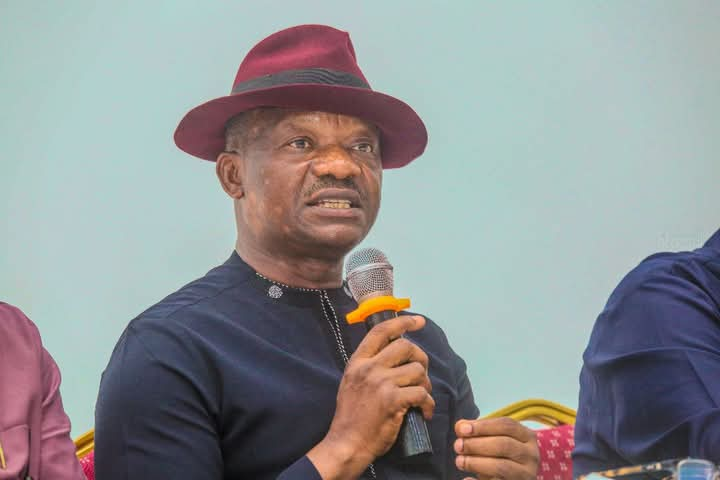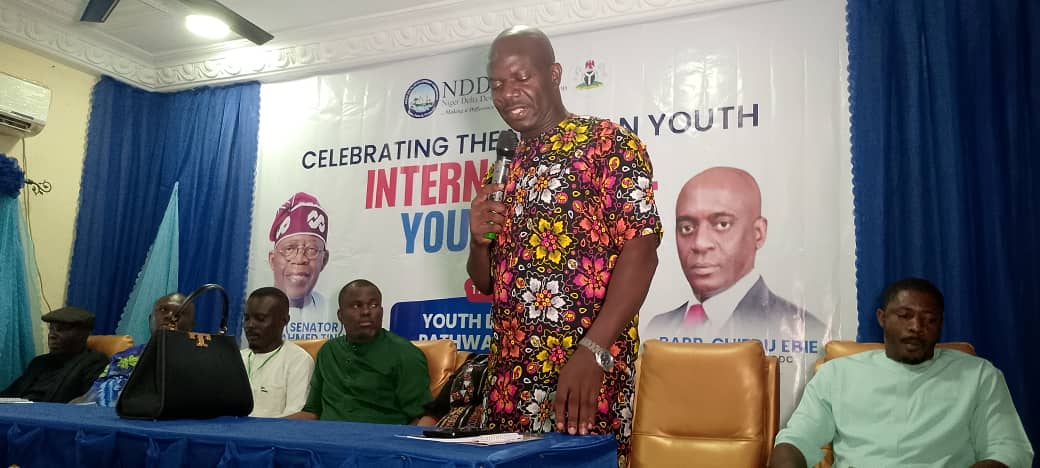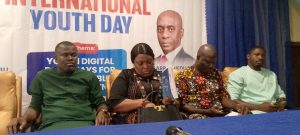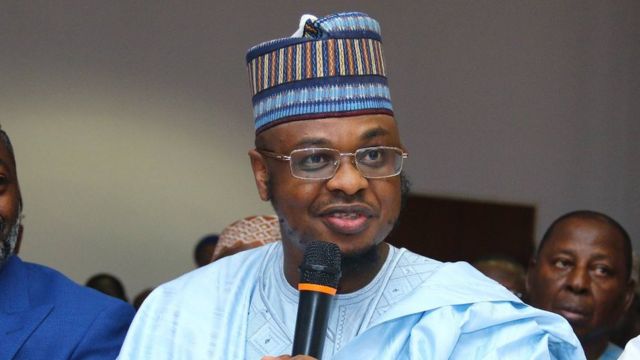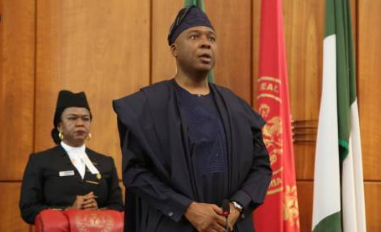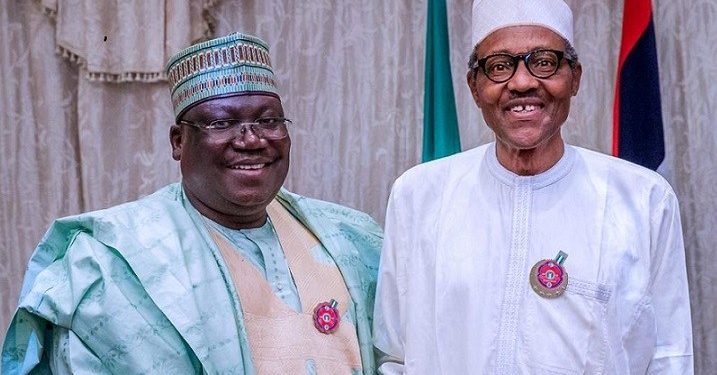Disturbed by the harsh economic downturn of the novel coronavirus [COVID-19] pandemic on the globe, the Governor of the Central Bank of Nigeria (CBN), Godwin Emefiele, has proposed a post-COVID-19 economic recovery path for Nigeria.
Emefiele insisted that despite the harsh realities of the pandemic on the world, however, there are hidden opportunities for Nigeria to harness. The CBN governor said the proposed economic recovery strategy spanning three years will be biased towards mass employment and wealth creation in the country focusing on four main areas, namely, light manufacturing, affordable housing, renewable energy, and cutting-edge research.
The CBN Governor made the proposition in an article titled “How Nigeria can turn the COVID-19 tragedy into an opportunity.”
Read full article below:
As many people are now aware, the outbreak of the Novel Coronavirus Disease (COVID-19) in China rapidly permeated and profoundly changed the world. While this crisis is first and foremost a public health issue, which has claimed the lives of over 123,600 people worldwide, and counting, the economic damages are unprecedented on several fronts: Crude oil prices declined dramatically to as low as US$17 per barrel by the end of March, even before applying the discounts many oil exporters are offering; Stock valuations for the NSE-ASI, Nikkei, Dow Jones and FTSE-100 declined by an average of 23.8 percent between January and March 2020; Global airlines have lost about US$252 billion in revenues and across the broad range of industries from hospitality to services, the pain is growing. These outcomes have expectedly thrown the global economy into a recession, the depth and duration of which is currently difficult to fathom. In fact, the International Monetary Fund (IMF) predicts that the global economy would decline by 3 percent this year.
Around the world, countries have moved away from multilateralism and responded by fighting for themselves with several measures to protect their own people and economies, regardless of the spillover effects on the rest of the world. According to the World Customs Organization, a total of 32 countries and territories, adopted stringent and immediate export restrictions on critical medical supplies and drugs that were specifically meant to respond to COVID-19. As of 10 April 2020, an updated count of total export restrictions by the Global Trade Alert Team at the University of St. Gallen, Switzerland suggest a total of 102 restrictions by 75 countries.
On 4 March 2020, Germany announced an export ban that applied to all sorts of medical protection gear including breathing masks, medical gloves and protective suits. Around the same time, President Macron announced that France will requisition all face masks produced in the country, a de facto export ban. Between 8 February 2020 and 6 April 2020, India released eight (8) different export notifications banning several drugs and medical supplies including hydroxychloroquine, ventilators, personal protections masks, oxygen therapy apparatus, and breathing devices. On 3 April 2020, the Trump Administration invoked the war-era US Defense Production Act to stop major US mask manufacturer, 3M, from exporting N95 respirator masks to Canada and Latin America.
Fears of a long global recession have also led to worries about unprecedented global food insecurity, with concerns that agricultural production may be dislocated by containment measures that constrain workers from planting, managing and harvesting critical crops. Rather than seek cooperative and global solutions, several countries have resorted to export restrictions of critical agricultural produce. According to the International Food Policy Research Institute (IFPRI), about 37 countries have enacted various forms of food export restrictions in response to COVID-19, even in countries where average production exceeds domestic consumption.
For example, Viet Nam, the world’s third largest exporter of rice, suspended granting rice export certificates until the country “reviews domestic inventories”. Russia, the world’s largest wheat exporter, announced a ten-day ban on the export of buckwheat and rice due to concerns over panic buying in local supermarkets.
What if these restrictions become the new normal? What if the COVID-19 pandemic continues in a second wave or another pandemic occurs in which all borders are shut and food imports are significantly restricted? What if we cannot seek medical care outside Nigeria and must rely on local hospitals and medical professionals? For how long shall we continue to rely on the world for anything and everything at every time?
Although these developments are troubling, they present a clear opportunity to re-echo a persistent message the Central Bank of Nigeria (CBN) has been sending for a long time, and at this time even more urgently so: We must look inwards as a nation and guarantee food security, high quality and affordable healthcare, and cutting-edge education for our people. For a country of over 200 million people, and projected to be about 450 million in a few decades, we can no longer ignore repeated warnings about the dangers that lie ahead if we do not begin to depend largely on what we produce locally. The security and well-being of our nation is contingent on building a well-diversified and inclusive productive economy.
When I became Governor of the Central Bank in June 2014, imports of rice, fish, wheat and sugar alone consumed about N1.3 trillion worth of foreign exchange from the Bank. My immediate question was: can we not produce these ourselves? After all, only a few decades ago, Nigeria was one of the world’s largest producers and exporters of many agricultural products like palm oil, cocoa and groundnuts. Today, we import nearly 600,000 metric tonnes of palm oil, whilst Indonesia and Malaysia, two countries that were far behind us in this crop, now combine to export over 90 percent of global demand. In 2017, Indonesia earned US$12.6 billion from its oil and gas sector but US$18.4 billion in from palm oil. I believe that this pandemic and the immediate response of many of our trading partners suggest it is now more critical than ever that we take back control; not just control over our economy, but also of our destiny and our future.
In line with the vision of President Muhammadu Buhari, the CBN has indeed created several lending programmes and provided hundreds of billions to smallholder farmers and industrial processors in several key agricultural produce. These policies are aimed at positioning Nigeria to become a self-sufficient food producer, creating millions of jobs, supplying key markets across the country and dampening the effects of exchange rate movements on local prices.
This philosophy has been a consistent theme of the CBN’s policies over the last few years. At the 2016 Annual Bankers’ Dinner, I challenged the bankers that we needed to take decisive actions to fundamentally transform the structure of our economy. Throughout that speech, I talked about the damaging effects of Nigeria’s unsustainable propensity to import, and opined that it was high time we looked inwards and stopped using hard-earned foreign exchange (FX) to import items that we should produce locally. This determination, therefore, formed the bedrock of the Bank’s policy, which restricts access to FX for importers of many items. These sentiments were re-echoed at the 2017 edition of the same Bankers’ Dinner with specific examples of several companies that have benefited significantly from this policy of self-sufficiency. With President Buhari’s full support, we have continued to refine this policy to ensure that the best interest of Nigeria is served.
Many times, the Bank has been accused of promoting protectionist policies. My answer has always been that leaders are first and foremost accountable to their own citizens. If the vagaries of international trade threaten their wellbeing, leaders have to react by compelling some change in patterns of trade to the greater good of their citizens.
That is why in response to COVID-19, we are strengthening the Nigerian economy by providing a combined stimulus package of about N3.5 trillion in targeted measures to households, businesses, manufacturers and healthcare providers. These measures are deliberately designed to both support the Federal Government’s immediate fight against COVID-19, but also to build a more resilient, more self-reliant Nigerian economy.
We do not know what the world will look like after this pandemic. Countries may continue to look inwards and globalization as we know it today may be dead for a generation.
Therefore, as a nation, we cannot afford to continueTherefore, as a nation, we cannot afford to continue relying on the world for our food, education and healthcare. The time has come to fully transform Nigeria into a modern, sophisticated and inclusive economy that is self-sufficient, rewards the hardworking, protects the poor and vulnerable, and can compete internationally across a range of strategic sectors.
In order to achieve this goal, we must begin immediately to support the Federal Government to:
1) Build a base of high quality infrastructure, including reliable power that can engender industrial activity;
2) Support both smallholder and large scale agriculture production in select staple and cash crops;
3) Create an ecosystem of factories, storages, and logistics companies that move raw materials for value-added production, and finished goods to markets;
4) Use our fiscal priorities to create a robust educational system that enables critical thinking and creativity, which would better prepare our children for the world of tomorrow;
5) Develop a healthcare system that is trusted to keep all Nigerians healthy, irrespective of social class;
6) Facilitate access to cheap and long-term credit for Small and Medium-Scale Enterprises (SMEs) and large corporates;
7) Develop and strengthen pro-poor policies that bring financial services and security to the poor and the vulnerable; and
8) Expedite the development of venture capitalists for nurturing new ideas and engendering Nigerian businesses to compete globally.
India is in a position to ban exports because it is producing critical drugs and medical supplies that the rest of the world needs. It also has companies that are global champions, and even merging with or acquiring peers in advanced nations. Why should this be out of our reach? We have the companies and the manpower. Some of the best brains in the world from the Americas to Europe and from Asia to Africa are Nigerians; driving global innovations in all fields. Nigerians are successful everywhere, and are already one of the most sought after immigrant groups in the United States. Now is the time to seize this opportunity and create an environment that empowers our people to thrive within our own shores.
To this end, the Central Bank has developed a Policy Response Timeline to guide our crises management and the orderly reboot of the Nigerian economy.
Immediate-Term Policies (0-3 Months)
In light of the fact that this crisis is an exogenous one thrust upon us without much warning, this phase reflects the government’s efforts at containment and mitigation. Although global cases are heading towards two million with over 123, 600 deaths as of 14 April 2020, we now have 343 cases, of which there have been 91 recoveries and sadly 10 deaths. With President Buhari’s continuing strong leadership, Nigeria can now test 1,500 persons per day in twelve (12) Molecular Test Laboratories. We believe that his strong leadership to impose early travel restrictions, lockdown, social distancing, and other measures have been greatly effective in curbing the spread of the disease. More so, the Presidential Task Force on COVID-19 and the Nigeria Centre for Disease Control (NCDC) have helped the country stay ahead of the curve with increased testing capacity, provision of better-equipped isolation centres, and effective contact tracing. Within this milieu, the CBN has responded in several ways, first by supporting hospitals and pharmaceutical industry with low interest loans to immediately deal with the public health crises; then by working with the private sector Coalition Against COVID (CACOVID) to support the Presidential Task Force on COVID-19 across its response, while mobilizing palliatives for the poor and vulnerable. Under this Immediate-Term Response, we have activated the following: 1) Ensure financial system stability by granting regulatory forbearance to banks to restructure terms of facilities in affected sectors; 2) Trigger banks and other financial institutions to roll-out business continuity processes to ensure that banking services are delivered in a sasafe social-distance regime for all customers and bankers; 3) Grant additional moratorium of 1 year on CBN intervention facilities; 4) Reduce interest rates on intervention facilities from 9 percent to 5 percent; 5) Create N50 billion targeted credit facility for affected households and SMEs; 6) Strengthen the Loan-Deposit Ratio (LDR) policy, which is encouraging significant extra lending from banks; 7) Improve FX supply to the CBN by directing all oil companies (international and domestic) and all related companies (oil service) to sell FX to CBN and no longer to the NNPC; 8) Provide additional N100b intervention in healthcare loans to pharmaceutical companies, healthcare practitioners intending to expand/build capacity; 9) Provide N1 trillion in loans to boost local manufacturing and production across critical sectors; and 10) Engender financial inclusion by ensuring the poor and vulnerable are able, by all means necessary, through banks, microfinance, community and non-bank financial institutions, to access financial services to meet their basic needs.
Short-Term Policy Priorities (0 – 12 months)
As soon as President Muhammadu Buhari and the Health authorities determine our Coronavirus Transmission Curve is flattening and many of the ongoing restrictions are eased, this will be the phase for repositioning the Nigerian economic space. As part of the lessons from the current pandemic, we must ensure that that our value-added sector, the manufacturing industry is strengthened. Accordingly, the CBN will pursue the following policies in this phase: 1) Reinvigorate our financial support for the manufacturing sector by expanding the intervention all through its value-chain. In most cases, we will ensure that primary products sourced locally provide essential raw material for the manufacturing sector except where they are only available overseas; 2) With the support of the Federal Government, the CBN will embark on a project to get banks and private equity firms to finance homegrown and sustainable healthcare services that will help to reverse medical tourism out of Nigeria. By offering long-term financing for the entire healthcare value-chain (including medicine, pharmaceuticals, and critical care), banks will work with healthcare providers to consolidate on the current efforts to rebuild our medical facilities in order to ensure Nigeria has world class affordable hospitals for the people of Nigeria and those wishing to visit Nigeria for treatment; 3) The CBN will promote the establishment of InfraCo PLC, a world class infrastructure development vehicle, wholly focused on Nigeria, with combined debt and equity take-off capital of N15 trillion, and managed by an independent infrastructure fund manager. This fund will be utilized to support the Federal Government in building the transport infrastructure required to move agriculture products to processors, raw materials to factories, and finished goods to markets, as envisaged at the CBN Going for Growth Roundtable in March 2020; and 4) Continue to prioritize the provision of FX for the importation of machinery and critical raw materials needed to drive a self-sufficient Nigerian economy.
Medium-Term Policy Priorities (0 -3 Years):
Once the world returns to some new normal having tamed COVID-19 by a combination of vaccines and social distancing, and the Nigerian economy reopens fully for business, we will act quickly to enable faster recovery of the economy by targeted measures towards particular sectors that are able to support mass employment and wealth creation in the country. We will do so by focusing on four main areas, namely, light manufacturing, affordable housing, renewable energy, and cutting-edge research.
In manufacturing, for example, it is pertinent to note that Nigeria’s gross fixed capital formation is currently estimated at N24.55 trillion made up residential and non-residential properties, machinery and equipment, transport equipment, land improvement, research and development, and breeding stocks. Of this estimated value, machinery and equipment, which are the main inputs into economic production, are currently valued at only N2.61 trillion. In order to pursue a substantial economic renewal, including replacement of at least 25 percent of the existing machinery and equipment for enhanced local production, we estimate at least N662 billion worth of investments to acquire hi-tech machinery and equipment. Therefore, the CBN will consider an initial intervention of N500 billion over the medium term, specifically targeted at manufacturing firms to procure state-of-the-art machinery and equipment and automated manufacturing models that would fast-track local production and economic rejuvenation, as well as support increased patronage of locally processed products such as cement, steel, iron rods, and doors, amongst several other products. The recent private sector investments in cement production using enhanced technology and automated manufacturing models is a good example of the kind of economic renewal we will be pursuing in this phase. We will develop a thorough screening process and stringent criteria for equipment types that would qualify for funding under this phase.
In order to boost job creation, household incomes and economic growth, we will focus our attention on bridging the housing deficit in the country by facilitating government intervention in three critical areas: housing development, mortgage finance, and institutional capacity. We will pursue the creation of a fund that will target housing construction for developers that provide evidence of profiled off-takers with financial capacity to repay. The current identification framework in the banking sector using the bank verification number (BVN) will be used to verify the information provided by the off-takers before the developer can access the funds. We will consider ways to assist the Mortgage Finance sub-sector as well as build capacity at the State levels for their land administration agencies to process and issue land titles promptly, implement investment friendly foreclosure laws and reduce the cost of land documentation, as these have remained major inhibiting factors in the provision of affordable housing in the country.
Over the next 3 years, we will also support the financing of environmentally friendly energy production, as this has a tangential long-term health benefits. We will look at efforts to drive innovation and research in every sector, through our universities, research institutions, creative industry initiatives, and all other media of novelty and inventions.
In conclusion, I believe we must now envision and work toward a Nigeria with the cutting edge medical facilities to provide world class care to the sick and vulnerable, enable our universities and research institutions to provide the requisite education and training that is required to keep these ecosystems functioning sustainably and efficiently, and millions of Nigerians employed in meaningful and well-paying jobs. This is the Nigeria that we must aspire to build.
COVID-19 may have plunged us into a crisis of unprecedented proportions. But, as Winston Churchill once admonished, we must never let a crisis go to waste.
